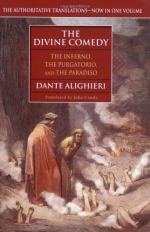|
This section contains 12,919 words (approx. 44 pages at 300 words per page) |

|
SOURCE: Reynolds, Barbara. Introduction to The Comedy of Dante Alighieri, the Florentine, Cantica III, Paradise (Il Paradiso), translated by Dorothy L. Sayers and Barbara Reynolds, pp. 13-52. London: Penguin Books, 1962.
In the following essay, Reynolds describes the Paradiso as a work of timeless aesthetic and intellectual validity.
It has been said1 that the joys of Heaven would be for most of us, in our present condition, an acquired taste. In a sense, Dante's Paradise is a story about the acquisition of that taste. The Dante who has been down to the uttermost depths of Hell and has climbed the Mount of Purgatory, to behold on its summit the wonder and enchantment of the Earthly Paradise, is no more prepared, after all these tremendous and unique experiences, than we should be ourselves for what he finds in Heaven. He is bewildered by his ascent from earth and totally at...
|
This section contains 12,919 words (approx. 44 pages at 300 words per page) |

|


